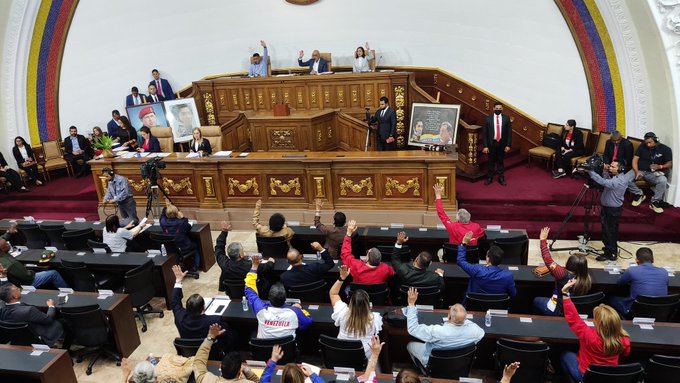The document was presented by Deputy Hermman Escarrá, head of the Special Commission for the Defense of the Territory of Guayana Esequiba and Territorial Sovereignty, after last week the International Court of Justice (ICJ) ruled on the case.
Escarrá recalled that almost 160,000 square kilometers were stripped from Venezuela and assured they will not cede any space in the national territory.
We are going to continue defending the homeland so as not to lose a millimeter of our space, he emphasized.
The constitutional lawyer remarked that Venezuelans must maintain a firm and invariable position in this regard and commented on the “unusual speed” of the ICJ when notifying today that on April 8, 2024 Venezuela must answer definitely “what would be the debate background on our rights”.
He expressed that, although this is an issue that has technical, historical, political, geoeconomic, geopolitical, doctrine, security and defense elements, it is mandatory, in its most direct part, to know the moment in which the Bolivarian Republic is.
The International Court of Justice unanimously determined on April 6 that the preliminary objection filed by Venezuela on the dispute it has with Guyana over the Essequibo territory is admissible.
In a ruling that it described as final, unappealable and binding on the parties, the high court of the United Nations rejected by a majority of 14 to one the preliminary objection presented by Caracas, according to the ruling read by the US judge Joan E. Donoghue, president of the ICJ.
The sentence also determined, by the same number of votes, that this body can decide on the merits of the Cooperative Republic of Guyana, since they are within the scope of the ruling of December 18, 2020.
Similarly, in a vote, it determined that it can rule on the merits of Guyana’s claims. In a statement, the Venezuelan government welcomed the court’s incidental ruling by validating the arguments that the illegal and fraudulent conduct of the United Kingdom can be reviewed. The note also praised that the ruling made clear the existence and validity of the 1966 Geneva Agreement, an agreement considered by Venezuela as the only valid instrument to settle this territorial dispute.
He stressed that the country will evaluate its implications in an “exhaustive manner” and “will adopt all the measures at its disposal” to defend its legitimate rights and territorial integrity.
ef/ro/jcd









